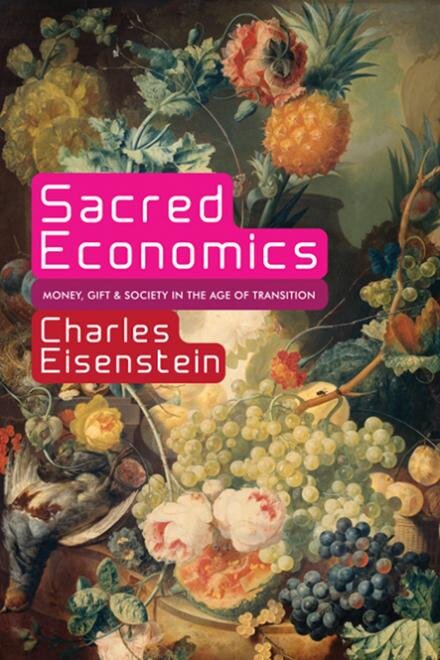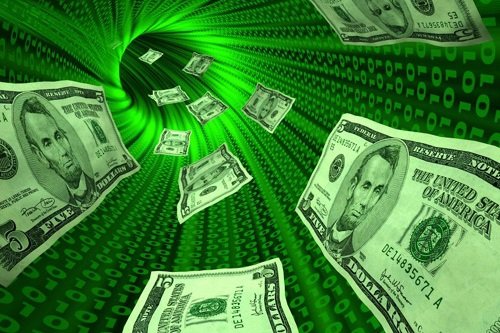Sacred Economics Summarized
Charles Eisenstein has written an important book for our time: Sacred Economics: Money, Gift and Community in an age of Transition. In the hopes of inspiring potential readers and informing the rest, I would like to offer a brief summary and commentary on four key ideas contained in his work. I highly recommend you investigate further. Whether or not one agrees with Eisenstein’s ideas is second to the fact that these are the conversations we need to be having. [All the quotes below are from Sacred Economics]
The Problem with Positive Interest
This relates to the issue of how money is created. The explanation that follows is a simplification of Eisenstein’s simplification. I highly recommend investigating the way our government creates money further. Nonetheless, the explanation that follows is sound, if lacking nuance.
The way that we create money today promises, even demands scarcity. Money is created when the Federal Reserve Bank purchases interest bearing securities (essentially investment contracts). Private banks use these bank reserves to loan businesses and indivuals money. Money comes into circulation when a bank declares to a customer “Here is $1million, please pay me back more than $1million” (i.e., the loan plus interest). This means that at any given time the amount of money in circulation is guaranteed to be less than the amount of money owed. For this to work, the GDP (Gross Domestic Product) must grow indefinitely. When growth falters (as in 2008), when suddenly mortgages, student loans and/or credit card debts are not being paid, and when “bubbles” burst, things begin to collapse. An injection of ‘new money’ is required. We can either create or borrow (e.g., from China) more money, but eventually this interest will come due as well. Because the current system produces interest bearing debt as a means of introducing currency, the economy ceases to function as soon as the GDP stops increasing. In other words, the need for endless growth has been institutionalized. In a world that has become increasingly concerned with sustainability, this seems incongruous.
In order to keep money flowing we require something to generate an increase in GDP. Currently the environment bears much of this burden. The environment can only have its bounty monetized so far. As natural resources dry up, we look to our social, cultural and spiritual capital demanding that none be finite and all be monetized. Sooner or later the hope for perpetual growth will collapse. In the meantime feelings of competition, insecurity and greed are natural within an interest based economy as we continue to seek growth where none can be found.
Is there another option?
The simplistic interpretations of Darwin's theme of survival of the fittest that once ruled popular thinking are beginning to be challenged with ideas of cooperation and mutual benefit in all realms of research and academia (*). The dogma of the “selfish gene” seems less and less tenable. Symbiosis exists in all levels of nature. We are each a collection of organisms. Your body is a sea of bacteria. You are enmeshed in a world of connection with all levels of life. How likely does it seem that we can sustain our parasitic dominator position before realizing we have always been symbiotic partners with all of nature? We have no choice but to feed as much as we are fed. An economic system that goes against nature and emphasises competition at the expense of cooperation and extraction at the expense of circulation seems increasingly less realistic. The flow of life has no top. We can no longer pretend to be above nature removing resources in the service of increasing GDP.
In a sustainable economy the flow of relationships is recognized as primary to sustaining life. We can now begin to search for ways to incentivize flow instead of hoarding and nurture our environment. Rather than systematically depleting our natural, social, cultural and spiritual capital, it is time to reconsider the assumed benefits of fiscal growth and our current means of creating money.
The Promise of Negative Interest
“Negative interest allows productive investment to continue, and money to circulate, even when the marginal return on capital is zero or less…”
Today we have positive interest rates, which implies that taking money out of circulation and storing it is remunerated. In other words, our current system rewards stagnation of capital/money unless the rate of economic growth is greater than the interest rate. The most recent recessions have caused some to question not just the rules, but the game itself. Globally there appears to be a dawning of the idea that the way we are currently attempting to perpetuate growth is not sustainable. Might seeking growth be the problem?
The current rules of the game allow the Fed to manipulate interest rates. In case of a recession, the Fed can go as far as to create near zero interest rates in order to temper the extreme consolidation of wealth (occupy Wall Street anyone?). Charles Eisenstein suggests we revive the centuries old (but not often implemented) tactic to lower rates even further. With negative interest rates, money loses value over time, which automatically penalizes the saving of money. This creates a convincing incentive to circulate money instead of saving it. Should wealthy people hold onto their fortune while others lose their jobs, their fortune automatically shrinks. With negative interest rates the way money flows mirrors the interconnectedness of all of existence.
Why are we in a recession now? We lack neither goods, nor the ability to produce them, nor the money to buy them in this economy. There is no limit to the number of times a dollar can change hands. The money exists; it simply isn’t flowing quickly enough. We lack financial fluidity. Instead we need to encourage goods and services to change hands often enough so that everybody gets what he/she needs. Our current, positive interest, system rewards stagnation. It rewards removing money from circulation. Negative interest is one extremely potent way to encourage fluidity.
While this type of economic incentive is potentially great for the poor, it will likely feel damaging for the wealthy. Current definitions of wealth focus on fiscal power. However wealth could be redefined so as to include our social, spiritual and environmental capital. This reframing will in turn force us to recognize that the only good is the common good. Many will have a hard time shifting their mindset from a culture of extracting, hoarding and isolating themselves from the masses to one of generating, circulating and community building. Sacred Economics asks individuals to look for their true sources of happiness and well being. Money facilitates the fulfillment of core needs, but once food, shelter and other basic needs are met recent studies show that little to no increased happiness is correlated with luxury. For most people happiness seems to be linked to their connection with others and communities. Increasing the circulation of money will foster stronger community bonds.
Depreciating Money
Demurrage is an extension of negative interest. What happens when all money loses value over time? Consider how we might act differently? The only way to utilize its full value would be to spend it quickly. In many ways this would make money more like the commodities that it can purchase. Material goods require maintenance, storage and are expensive to transport, which has a cost. Their values depreciate over time. Currently, money is a unique abstraction that is a better store of value than most everything that it can be spent on. We could just as well conceive money in line with how everything in the natural and technological worlds actually work. It would be much more beneficial to circulate money, creating an outward flow that will continuously flow back to you, than to withdraw money from circulation and only circulate it if you can earn more money for it (i.e., interest). As Eisenstein points out, with any true good, it makes more sense to share than to hoard. If one has 100 loaves of bread, it is better to feed the community now and let them repay you in kind than to let 95 loaves of bread rot because you could not eat them yourself. You not only get repaid when your neighbors cook, you build that most cherished of commodities: community.
“I store meat in the belly of my brother”
On the other hand, positive interest makes money the one thing that never decays, but actually appreciates in value indefinitely. Therefore it makes sense to value money above all else.
“…while a commons-backed currency frees work to go toward consumptive purposes…..”
This is a complex and underdeveloped topic. Currently we externalize much of the cost associated with the our unsustainable consumption. Whether through the extraction of natural resources or the subsidization of industries, the value of what we get is not clearly reflected in the monetary cost. We actually get much more than we pay for. Much of the hidden costs—whether in food, clothing, gas or our homes—result from the fact that nobody is held responsible for depleting the environment and other aspects of “the commons.” But our ability to deny the brutal impact of theses practices is running out.
Rather than having our money be backed by gold (as it once was) or nothing (as it now is) we could choose to back the dollar with the shared assets we all benefit from, which Eisenstein defines as the sum of our natural, social, cultural and spiritual capital. The metrics are not obvious, but I like the idea of rooting our actions and transactions as deeply as possible in the soil we all live on. Tying money to the sources of production would mean that anyone who taps these common goods (trees, water, land, cultural heritage, intellectual heritage, artistic heritage, and so on) would have to pay for using them. Hence, a commons-backed currency means that we internalize costs that are now denied.
Currently a company can pollute a river while extracting its resources without being responsible for the cost. But who owns the water? And should those downstream have less access to clean water? In an increasingly globally aware mind, natural resources belong to us all. Economic growth is limited by our resources and we can deny the limitations of shared resources for only so long. Overproduction (by nature unsustainable) is a result of disconnecting GDP from the resources it relies on for production. A commons-backed currency would promote respect for resources we all depend on while facilitating their circulation. It will anchor us in the understanding that endless growth is impossible in a finite world. We would be much less ready to degrade the environment if doing so had an economic cost.
Social Dividends
“…a third thread in the tapestry: the social dividend, which frees the purchasing power of the workers from the need for full employment in the money economy.”
Why has the much promised ‘age of leisure' never arrived? Why if ‘a diesel backhoe can do the work of 500 men with shovels, a bulldozer can do the work of 500 men with axes and a computer the work of 500 accountants with pens and paper….do most people on earth still live in a daily experience of scarcity?’ Prior to such technological improvements we saw promise for machines to carry the burden that was once on our backs freeing us to enjoy the fruits of the machines labor. What happens in reality is that one person runs the backhoe, bulldozer or computer and the other 499 are put out of a job. The solution? Create more jobs! Again, the economy must grow! Convert more natural resources into consumables! But we know now that this is not sustainable. Just as importantly, it does not seem to be making us any happier.
“Workers receive a shrinking share of revenues as industry becomes less labor-intensive and more capital-intensive – eventually leading to poverty, polarization of wealth, and economic depression due to falling demand.”
In the short term our current system allows improvements in efficiency to reward a few, but penalizes the rest. Large factories may become more profitable as their owners replace labor with technology. They increase the productivity. Yet this ‘progress’engenders the conditions of its own collapse insofar as the very people who would be purchasing the goods the factory supplies no longer earn the wages to do so. Eventually even the factory owners suffer. We are allowing technological innovation to make us poorer. Why do so many have less free time now than ever before? Because rather than making sure that the machine replacing 499 workers creates leisure for the working class, these 499 workers must now find a new job. Since perpetual growth is impossible in a finite world, eventually, we get unemployment. Welcome to our present time.
An important piece of Eisenstein’s perspective is that we don’t really need more stuff. We generate amazing amounts of waste and few of our purchases legitimately increase our enjoyment of life. Our survival (try: basic material) needs, those that the economy should provide, are finite, but, as Eisensteins puts it, “we do have certain needs that are in a sense infinite. The need for connection to nature, the need to love, play and create, the need to know and be known – none can be satisfied by buying more things. We are attempting to satisfy our need for the infinite through an accumulation of more and more of the finite. It is like trying to build a tower to heaven.”
Above all things, Eisenstein champions human connection, exposing the ways our current economic system discourages it and the ways that we could move towards encouraging it. Rediscovering gift economies is one potent avenue we could consider. Imbuing money with sustainable qualities instead of entrusting it with a merciless ability to grow is another. Tying the value of money to natural resources and removing hidden subsidies would bring us closer still. Leveraging technology to support us all instead of making jobs increasingly scarce (and yet still mandatory) is a potent option. (Eisenstein also suggests developing local and complementary currencies, which I will not discuss here for space constraint).
“The situation in America, the most highly monetized society the world has ever known, is this; some of our needs are vastly overfilled while others go tragically unmet. We in the richest societies have too many calories even as we starve for beautiful, fresh food; we have overlarge houses but lack spaces that truly embody our individuality and connectedness, media surrounds us everywhere, while we starve for authentic communication. We are offered entertainment every second of the day but lack the chance to play.”
A Social Dividend would offer all citizens a basic living payout from the public pool. I know, it sounds like welfare at its worst, and to be honest, that was my reaction at first. A deeper understanding of how this ties in with negative interest and a commons-backed currency is required to understand where all of this money would come from. Briefly, negative interest lowers the money supply, which requires creating new money to keep the money supply stable. Reissuing this money is one source of the social dividend. Another source is the revenue from leasing the commons to corporations. A commons-backed currency means that all corporations pay for the resources they use, but which all people truly own. Since we are all owners we all share in the proceeds. The amount would be minimal, but it would provide enough for those not compelled to contribute further.
This analysis of the economic conundrum we are in is complex. The three-pronged beginning of a solution that Eisenstein offers in Sacred Economics represents a radical departure from the current dominant economic principles. Neither of these make it untenable. What is needed is an honest appraisal of where we find ourselves and a willingness to consider radical alternatives. Nothing would be more detrimental than to continue business as usual and let the future choose us. Collapse is happening. The sooner we chart a new course the less painful the transition will be.
~~~~
Editor- Gilles Herrada
~~~~
Endnotes
(*) Cf. The final section of the article Neotribal Zeitgeist (+Companion Notes), entitled 'Retrieving Our Cooperative Past', for more on this point.
(**) To watch a short film on Sacred Economics by Ian MacKenzie, plus more commentary on the book by Chris Dierkes, cf. the article Sacred Economics- A Short Film Debut.






